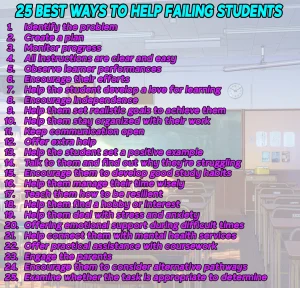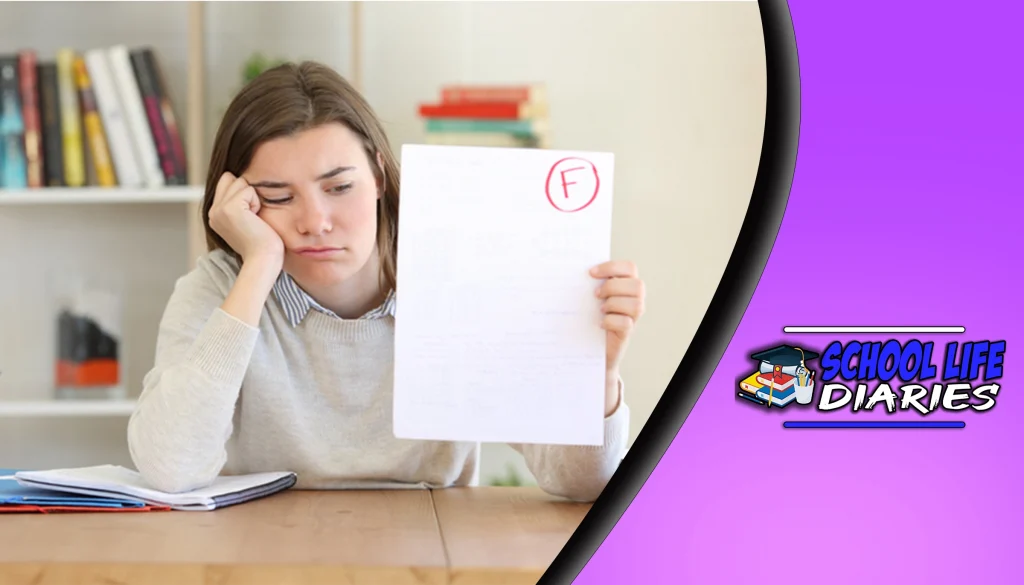Supporting failing students and helping them find the motivation to succeed is an important part of a teacher’s job. In recent years, many high schools have reported increased drop-out rates due to students feeling overwhelmed or disconnected from their coursework. In this blog post, we will explore best ways to help failing students back on track.
No one wants to see a student fail, but what can educators do when a student is struggling? Some are small changes that can make a big impact, while others require more effort, but all of them will help students succeed. Try out some of these strategies and see how they work. Here is a list of the 25 best ways to help failing students.
25 Best Ways to Help Failing Students Succeed
1. Identify the Problem:
The most important thing that a teacher can do to help a failing student is to identify the problem. Sometimes it is easy to see what the student is struggling with, and sometimes it takes a bit more detective work. Once the problem is identified, the teacher can then focus on helping the student address that issue.
2. Create a Plan:
Once the problem has been identified, the next step is to create a plan to help the student address that issue. The plan should be tailored specifically to meet the needs of the student. It should also be realistic and should take into account what resources are available to the teacher and the student.
3. Monitor Progress:
The best way to help a failing student is to monitor their progress constantly and make changes to the plan as needed. It is important for both the teacher and the student to be constantly on the same page when it comes to monitoring progress so that there are no surprises along the way.
4. All the Instructions are Clear and Easy:
Make sure that all instructions, questions, and explanations are clear and easy to understand. Speak at a pace that is easy for students who are struggling in school to follow. Engage your students by using a variety of methods to keep their attention. Make sure that you are always professional in your delivery.
5. Observe Learners’ Performances:
Some students learn differently and have problems in school. We can help these students by observing their performance closely to find the areas where they are struggling and then helping them to improve in those areas.
6. Encourage their Efforts:
The effort is important, even if the results are not always what we want them to be. A teacher should encourage their students to put forth their best effort, even when it seems like there is no hope for success. This will help the student develop a “growth mindset” and will teach them that effort leads to success over time.
7. Help the Student Develop a Love for Learning:
One of the best things a teacher can do is help their students develop a love for learning. If a student enjoys learning, they are more likely to be successful in school. There are many ways to help a student develop a love for learning, but one of the best is to simply make learning fun.
8. Encourage Independence:
One of the hallmarks of a successful student is independence. A teacher should encourage their students to be as independent as possible. This means giving them opportunities to work on projects alone, making decisions for themselves, and taking responsibility for their own learning.
Related Article: 25 WAYS TO HELP STUDENTS WHO ARE IN DANGER Of ACADEMIC FAILURE
9. Help them Set Realistic Goals to Achieve them:
Setting goals is an important part of any successful plan, and it is no different for students. A teacher should help their students set realistic goals that they can work towards. These goals should be specific, measurable, attainable, relevant, and time-bound.
10. Help them Stay Organized with their Work:
What a teacher can do to help a failing student is to help them stay organized. This means teaching them how to keep track of their assignments, due dates, and materials. It also means helping them develop good study habits, such as setting aside time each day to study and getting enough rest.
11. Keep Communication Open:
Make sure that teachers can do is to keep the lines of communication open with their students. This means being available to answer questions, give feedback, and provide support. It also means being willing to listen to the student’s concerns and ideas.
12. Offer Extra Help:
The most important thing a teacher can do is offer extra help to their students. This could mean offering tutoring sessions, providing study materials, or giving extra time on assignments. Whatever the case may be, it is important to make sure that the student knows that they can always come to the teacher for help.
13. Help the Student Set a Positive Example:
A teacher can also help their failing students by helping them set a positive example. This means being a good role model and showing the student how to behave in a respectful and responsible manner. It also means being supportive and encouraging, even when things are tough.
14. Talk to them and Find Out why they’re Struggling:
When you’re talking to them, be sure to ask why they’re struggling to help failing students. There may be something specific about that student’s situation that is making it difficult for them to help improve their grades.
15. Encourage them to Develop Good Study Habits:
There are a few things that you can do to help your failing students develop good study habits. First, make sure they have a quiet and comfortable place to study. Encourage them to set aside specific times each day for studying. Help them develop a plan for studying and test-taking. Praise them for their efforts, even if they don’t always succeed.
16. Help them Manage their Time Wisely:
The best way to help struggling students is to help them manage their time wisely. This means ensuring that they are using their time effectively in order to get the most out of it.
17. Teach them How to be Resilient:
Resilience is the ability to bounce back after a setback. It is important for students to learn how to be resilient so that they can cope with failure and continue to try their best.
18. Help them Find a Hobby or Interest:
A hobby or interest can provide a sense of purpose and meaning in life that can be beneficial for students who are struggling in school. There are many different hobbies and interests that students can explore, so it is important to find one that is compatible with the student’s personality and interests.
19. Help them Deal with Stress and Anxiety:
If you know that a student is struggling with stress or anxiety, it might be helpful to talk to them about the different ways that they can deal with their problems. You can also suggest that they speak to a counselor or therapist, who can help them develop a plan specifically tailored to their needs.
20. Offering Emotional Support during Difficult Times:
The most important thing you can do to help failing students is to offer emotional support. This may mean listening to them when they need to talk, or providing a shoulder to cry on. It’s important to let them know that you care about them and want to help them through this tough time. If possible, try to provide some practical assistance as well, such as helping them study or finding tutors. But the most important thing is to be there for them emotionally.
21. Help Connect them with Mental Health Services:
Mental health services can be a great help for students who are struggling in school. By connecting them with services, you can provide the support they need to get back on track.
22. Offer Practical Assistance with Coursework:
Offering practical assistance with coursework can help to fail students succeed in their classes. If you are a failing student, reach out to your classmates, friends, or family members for help. Many people are happy to offer assistance, and it can make all the difference in your success. In addition, consider seeking help from a tutor or online resources. With some effort, you can get back on track and improve your grades.
23. Engage the Parents:
It is important for parents to be involved in their children’s education. When a student is struggling, it is often helpful to have the parents step in and help out. This can mean checking in with the teacher, attending parent-teacher conferences, or helping with homework. By getting parents involved, we can help improve the academic performance of struggling students.
24. Encourage them to Consider Alternative Educational Pathways:
Alternative pathways to help failing students can include options such as vocational schools, apprenticeships, and online learning. These pathways can provide a more individualized education that can better meet the needs of failing students. Additionally, they can be more affordable than traditional four-year colleges.
25. Examine whether the Task is Appropriate to Determine:
Assessing the appropriateness of a task in order to ascertain how to help failing students is important. It can help to identify specific areas where help is needed and can provide a framework for creating interventions that are tailored to the needs of the students.
Final Verdict:
If you are a struggling student, or know one who is, there are ways to get help. Some may take more effort than others, but all of them are worth considering. If you need extra support in school, talk to your teacher or a guidance counselor about what resources are available.If you are a struggling student, or know one who is, there are ways to get help.
Some may take more effort than others, but all of them are worth considering. If you need extra support in school, talk to your teacher or a guidance counselor about what resources are available. It is important to tailor your approach to each individual student, and find what works best for them in order to help them be successful.






Dear Sir/Madam my child is a boy doing grade 2,he is struggling with wring and memory loss,he is good in maths,I assist him but,he is astill struggling and i dont have money to pay tutor,How can i get help,his teacher advised me to let him repeat the class.Im not happy about that solution,please help me if you can
Dear Boniswa Ntshika,
Thank you for reaching out and sharing your concerns about your son’s challenges in grade 2. It’s truly admirable that you’re seeking ways to support him during this time. I understand your worries about his struggles with writing and memory loss, and I’m here to offer some suggestions that might be helpful for both you and your child:
Break Tasks Down: Encourage your son to break down writing tasks into smaller, manageable steps. This can make the process less overwhelming.
Practice Regularly: Set aside time for daily writing practice. Even a short amount of time each day can make a difference in his progress.
Memory Games: Incorporate memory-boosting games and activities into his routine. Simple card games, puzzles, and memory matching games can be both fun and beneficial.
Visual Aids: Use visual aids like charts, diagrams, and drawings to help him understand concepts and retain information better.
Read Together: Reading books together can improve his writing skills and expand his vocabulary. Discuss the stories to enhance his comprehension.
Encourage Creativity: Let him write about topics he’s passionate about. This can make the writing process more enjoyable and engaging.
Use Technology: There are numerous educational apps and online resources that can make learning more interactive and appealing.
Positive Reinforcement: Celebrate his progress, no matter how small. Positive reinforcement can boost his confidence and motivation.
Mindfulness Activities: Incorporate mindfulness exercises into his routine to enhance focus and concentration.
Stay Patient: Progress may take time, so be patient and understanding. Offer support and encouragement throughout his journey.
Lastly, I understand your concerns about repeating a grade. While it’s a difficult decision, remember that the focus should be on your child’s overall development and well-being. If, after trying various methods, repeating a grade seems to be the best option, consider discussing this with his teacher and school counselors to explore all possible solutions.
I hope these suggestions prove helpful for your son’s educational journey. Remember, you’re not alone in this, and there are numerous resources available to support your efforts. Wishing you and your son all the best.
Sincerely,
Williamson